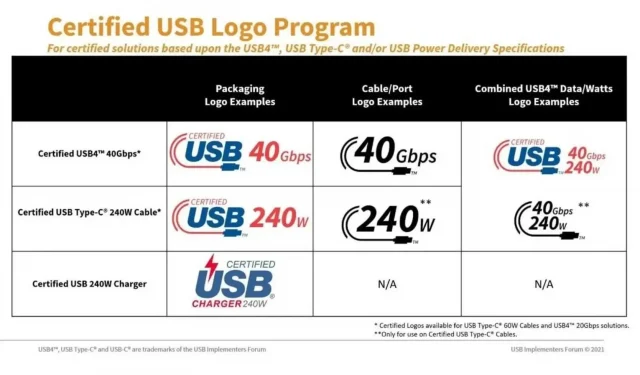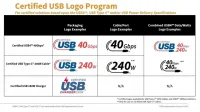USB-C 240W 40Gb/s appears. The most capable laptops should be able to take advantage of this to a great extent.
Last year, the 240W USB-C 2.1 standard promised to offer much higher output power (up to 40Gbps), but the general public had to wait until the first products hit the market. Until now, you really had to “make do with”the output power of 100 watts. This opened up a field of possibilities. Club3D is releasing images and specs of these 240W USB-C cables today, and there’s a lot to be excited about.
The advent of USB-C 240W 40Gbps
First, it opens the door to a standard USB-C Power Supply Unit (PSU) that can replace the default PSU found on laptops with very powerful CPUs and/or GPUs. The power banks provided by the manufacturers are quite capable, but it’s much nicer to use USB-C to charge everything everyday. In the office, colleagues can lend each other their power supply when needed, but now everything will be done with a single and simple cable. No need to carry one for each device.
Second, the PSU aftermarket often offers products that are smaller, lighter, more efficient, and have more ports. Which again is quite noticeable when you look at how bulky 240W PSUs can be.
In addition, these cables can provide high speed data transfer, which is very useful in daily life. Those who work with large files, such as 4K or 8K video, will appreciate having a 20 or 40 Gb / s cable on hand for file transfer.
The Most Powerful Laptops Should Have Big Benefits
However, there is some bad news. Club3D combines different capacities including top-up only, 20Gbps and 40Gbps. Of course, it will be quite difficult to visually navigate in each product. In terms of selling price, each of its characteristics obviously matters a lot, but the general public would appreciate being able to navigate easily.
240W 40Gb/s USB-C is very interesting anyway, but it will only reach its full potential when laptop manufacturers decide to use such USB-C ports for charging and get rid of (well, some will say) proprietary 240W. A little more patience.


